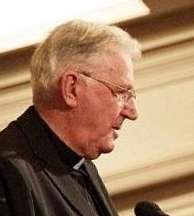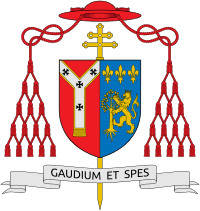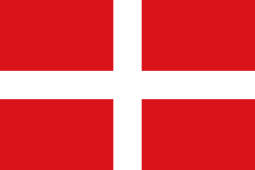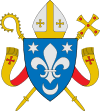Cormac Murphy-O'Connor
| His Eminence Cormac Murphy-O'Connor | |
|---|---|
| Cardinal, Archbishop Emeritus of Westminster | |
 | |
| Appointed | 15 February 2000 |
| Installed | 22 March 2000 |
| Term ended | 3 April 2009 |
| Predecessor | George Basil Hume |
| Successor | Vincent Gerard Nichols |
| Other posts | Cardinal-Priest of S. Maria sopra Minerva |
| Orders | |
| Ordination |
28 October 1956 by Valerio Valeri |
| Consecration |
21 December 1977 by Michael George Bowen |
| Created Cardinal |
21 February 2001 by John Paul II |
| Rank | Cardinal-Priest |
| Personal details | |
| Birth name | Cormac Murphy-O'Connor |
| Born |
24 August 1932 [1] Reading, Berkshire, England[1] |
| Nationality | British |
| Denomination | Roman Catholic |
| Parents | George and Ellen Murphy-O'Connor |
| Previous post |
|
| Motto | Gaudium et Spes |
| Coat of arms |
 |
Cormac Murphy-O'Connor (born 24 August 1932) is a retired bishop and cardinal of the Roman Catholic Church,[1] Archbishop Emeritus of Westminster and former President of the Catholic Bishops' Conference of England and Wales. He was created a cardinal by Pope John Paul II in the 2001 Consistory. He submitted his resignation as archbishop on reaching his 75th birthday in 2007; it was accepted on 3 April 2009 when Pope Benedict appointed Vincent Nichols as the new archbishop.[2]
By virtue of his position as Archbishop of Westminster, Murphy-O'Connor was sometimes referred to as the Catholic Primate of England and Wales. However, though the holders within the Church of England of the posts of Archbishop of Canterbury and Archbishop of York are called the "Primate of All England" and "Primate of England" respectively, the title of primate has never been used by the de facto leaders of the Catholic Church in England and Wales.
Early life
Cormac Murphy-O'Connor was born in Reading, Berkshire, the fifth son of George and Ellen Murphy-O'Connor (died 1971), who emigrated from County Cork in Ireland before the First World War and married in 1921.[3] Two of his uncles, one aunt, two cousins and two of his brothers, Brian (died 2012)[4] and Patrick, were also ordained or members of religious orders. His youngest brother, John, was a regular officer in the Royal Artillery who died of Renal cell carcinoma;[5] he has two other siblings, James (a doctor and rugby player) and Catherine. After attending Presentation College in Reading and Prior Park College in Bath, Murphy-O'Connor then began his studies for the priesthood in 1950 at the Venerable English College in Rome, where he received a degree in theology. Thereafter, he earned a licentiate in philosophy and a licentiate in sacred theology from the Pontifical Gregorian University. He was ordained on 28 October 1956, by Valerio Cardinal Valeri. For the next decade was engaged in pastoral ministry in Portsmouth and Fareham.[1]
Church career
Parish priest
In 1966, Murphy-O'Connor became the private secretary to Bishop Derek Worlock of Portsmouth. In September 1970, he was appointed parish priest of the Immaculate Conception church in Portswood, Southampton. Soon afterwards, in late 1971, he was appointed rector of the Venerable English College,[1] his alma mater. As rector he hosted the Anglican Archbishop of Canterbury, Frederick Donald Coggan, on his historic visit to Pope Paul VI in 1977. He was granted the title of Monsignor on 10 March 1972.
Bishop
On 17 November 1977, Murphy-O'Connor was named Bishop of Arundel and Brighton by Pope Paul VI. He received his episcopal consecration on the following 21 December from Bishop Michael Bowen, with Archbishop George Dwyer and Bishop Anthony Emery serving as co-consecrators. He held important positions among the bishops of Europe and has also been consistently influential in ecumenical work; from 1982 to 2000 he was Co-Chairman of the Anglican Roman Catholic International Commission (ARCIC). In 2000 he was awarded the Lambeth degree of Doctorate in Divinity by the Archbishop of Canterbury, George Carey, in recognition of his work for Christian unity.
Archbishop and cardinal
| Styles of Cormac Murphy-O'Connor | |
|---|---|
 | |
| Reference style | His Eminence |
| Spoken style | Your Eminence or My Lord Cardinal |
| Informal style | Cardinal |
| See | Westminster (emeritus) |
Murphy-O'Connor was appointed the tenth Archbishop of Westminster, and thus head of the Catholic Church in England and Wales, on 15 February 2000; in November of that year he was elected President of the Catholic Bishops' Conference of England and Wales.
In the consistory of 21 February 2001 he was created Cardinal-Priest of Santa Maria sopra Minerva by Pope John Paul II.
As a new cardinal he was appointed to four Curial organisations: the Congregation for Divine Worship and the Discipline of the Sacraments, the Administration of the Patrimony of the Holy See, the Pontifical Council for the Study of Organisational and Economic Problems of the Holy See, and the Pontifical Council for the Family. He also served on the Pontifical Councils for Culture and for Laity, and was secretary of the Vox Clara commission which oversees the translating of liturgical texts from Latin into English.
In August 2001, Murphy-O'Connor was created a Freeman of the City of London.
In 2002, in Westminster Abbey, he was the first cardinal to read prayers at an English Royal Funeral Service (for the Queen Mother) since 1509. In 2002 he had his portrait painted for Westminster Cathedral by the artist Christian Furr.[6] He was one of the cardinal electors who participated in the 2005 papal conclave that selected Pope Benedict XVI, but was ineligible to participate in the 2013 conclave due to being aged over 80.
On 28 October 2006 Murphy-O'Connor celebrated 50 years of ordination with a Jubilee Mass in Westminster Cathedral.[7]
Retirement
Shortly before reaching the mandatory retirement age of 75, Murphy-O'Connor submitted his resignation as Archbishop of Westminster to Pope Benedict XVI, who asked that Murphy-O'Connor remain in his position "until he chooses otherwise". Murphy-O'Connor said in a subsequent letter to his clergy, "I am very content to accept the Holy Father's (i.e., the Pope's) request."[8] On 3 April 2009 Benedict appointed Vincent Nichols as Murphy-O'Connor's replacement. All Murphy O'Connor's predecessors died in office, so he is the first to become Archbishop Emeritus of Westminster. He now lives in semi-retirement in Duke's Avenue, Chiswick, London.
On 30 October 2009, in addition to his other duties in Rome, Pope Benedict appointed Murphy-O'Connor as a member of the Congregation for Bishops, where he served until his 80th birthday. It was unusual to receive such an appointment after retirement.[9][10]
In June 2010, after the Ryan Report and Murphy Report on the abuses by the Catholic Church in Ireland, Murphy-O'Connor was named along with others to oversee the apostolic visitation of certain dioceses and seminaries. Murphy-O'Connor was named as the Visitor to the Diocese of Armagh and its suffragan sees. He will report back to the Holy See on what steps have been taken since the reports were issued, and what else needs to happen.
Murphy-O'Connor, in a speech delivered on 17 May 2012 in Leicester's Anglican cathedral, said, "In the name of tolerance it seems to me tolerance is being abolished." He had strong words regarding the effect that secularists have had in the UK. "Our danger in Britain today is that so-called Western reason claims that it alone has recognized what is right and thus claims a totality that is inimical to freedom", he said. "No one is forced to be a Christian. But no one should be forced to live according to the new secular religion as if it alone were definitive and obligatory for all humankind." and "The propaganda of secularism and its high priests wants us to believe that religion is dangerous for our health. It suits them to have no opposition to their vision of a brave new world, the world which they see as somehow governed only by people like themselves."[11]
Views
Abuse scandal
Murphy-O'Connor found himself subject to public scrutiny regarding a priest in his diocese when he was Bishop of Arundel and Brighton. During this time it was brought to his attention that a priest, Michael Hill, was a sexual abuser of children. In 2000, when O'Connor became Archbishop of Westminster, the case became known to the general public.[12]
Response to Summorum Pontificum
In November 2007, Murphy-O'Connor issued a letter to the clergy of his diocese regarding Pope Benedict XVI's Summorum Pontificum motu proprio relaxing the restrictions on the use of the 1962 Roman Missal. Some interpreted the letter as contradicting the motu proprio's assigning to parish priests the right to grant the required permission for public celebration of Mass according to that final version of the Tridentine Mass.
Damian Thompson, the editor of the Catholic Herald, commented that Murphy-O'Connor "begins by announcing that the Pope's purpose in removing restrictions on the Tridentine Mass was 'to restore unity within the Church – both to enable those who truly desire unity to remain in that unity and to offer those who have not yet accepted the liturgical reforms and teachings of the Second Vatican Council a way back to full communion with the Church.'" And in his blog What Does the Prayer Really Say? Fr John Zuhlsdorf said that Murphy-O'Connor's comments constituted "a horribly narrow and inaccurate way of reading the Holy Father's (i.e., the Pope's) provisions", and claimed that a comment by Archbishop Malcolm Ranjith, that "some dioceses, even interpretative documents which inexplicably aim at putting limits on the Pope's Motu Proprio" are motivated by "pride, one of the gravest sins", was a response to documents such as Murphy-O'Connor's.[13]
AIDS prevention
On 3 December 2006, Murphy-O'Connor issued a response to a statement made by Prime Minister Tony Blair on World AIDS Day (1 December 2006) in which Blair said, "The danger is if we have a sort of blanket ban from religious hierarchy saying it's wrong to do it, then you discourage people from doing it in circumstances where they need to protect their lives." In response to this Murphy-O'Connor said, "I think what I would like to say to the prime minister is that it would be much better if he used that money to provide more antiretroviral drugs – medicines – for the millions of children, women who are affected. I speak to bishops in Africa and they tell me that their dioceses are flooded with condoms and I said, 'Well, has it affected?' They said, 'Well, sad to say it has meant more promiscuity and more AIDS'".[14]
Illegal immigrants
On 7 May 2007 Murphy-O'Connor addressed a crowd of illegal immigrants in Trafalgar Square in support of the Strangers into Citizens campaign, which is calling for a path into citizenship for undocumented workers. Previously he had commissioned major research on the pastoral challenges of migrants in his parishes and this had been published to front page coverage in The Times and leader coverage internationally as The Ground of Justice written by Francis Davis and Jolanta Stankeviciute who are now based at the Las Casas Institute, Blackfriars Hall, University of Oxford.[15]
Gay adoption
In early 2007, Murphy-O'Connor sent a letter to Blair over the impending regulations that the rights of gay couples extend to an equal opportunity relating to adoption. He said that the law would force people to "act against the teaching of the Church and their own consciences" with regard to Catholic adoption agencies and requested an exemption from the law. He continued, saying, "We believe it would be unreasonable, unnecessary and unjust discrimination against Catholics for the government to insist that if they wish to continue to work with local authorities, Catholic adoption agencies must act against the teaching of the Church and their own consciences by being obliged in law to provide such a service."[16]
Family planning
Murphy-O'Connor has denounced contraception and abortion many times. In February 2008 he sacked the board of St John and St Elizabeth's, a partly NHS funded Catholic hospital, after it had permitted a GP’s surgery to move onto the site and administer family planning.[17]
In February 2013 Murphy-O’Connor said that, while a radical departure from previous teaching was not likely, it would be "wise" to focus on "what's good and what's true" about marriage and family life instead. He said that Catholic teaching on sexuality should steer away from saying "we condemn this, we condemn that". "I think that every Pope will face what needs to be faced and with regard to contraception I think the Pope won't say the Church has been wrong the whole time. He'll be saying there are ways…I think the Pope will be as every other Pope has, particularly Pope Benedict, understanding that the fundamental teaching on sexuality is concentrated on marriage, on family life. I think that the Church would be wise actually to focus on that in her teaching, rather than saying 'we condemn this, we condemn that, or the other'. No – focus on what’s good and what’s true."[18]
Embryo Bill
In March 2008 Murphy-O'Connor joined Cardinal Keith O'Brien of Scotland in opposing the Government's proposed Embryology Bill. The Government had instructed its MPs to vote for the bill, which angered some Catholic MPs. Murphy-O'Connor said "Certainly, there are some aspects of this bill on which I believe there ought to be a free vote, because Catholics and others will want to vote according to their conscience." The Government gave in to the pressure and promised to allow MPs a free vote.[19]
Atheism
In 2008 Murphy-O'Connor urged Christians to treat atheists and agnostics with deep esteem, "because the hidden God is active in their lives as well as in the lives of those who believe".[20] However, in 2009, speaking after Archbishop Vincent Nichols' installation, he said that a lack of faith is "the greatest of evils." He blamed atheism for war and destruction, and implied it was a greater evil even than sin itself and that atheists are "not fully human".[21][22]
Distinctions
-
 Sovereign Military Order of Malta: Order pro merito Melitensi
Sovereign Military Order of Malta: Order pro merito Melitensi -
.svg.png) House of Bourbon-Two Sicilies: Knight Grand Cross of Justice of the Sacred Military Constantinian Order of Saint George
House of Bourbon-Two Sicilies: Knight Grand Cross of Justice of the Sacred Military Constantinian Order of Saint George
Other
References
- 1 2 3 4 5 Cardinal Cormac Murphy-O'Connor: recession may be jolt that selfish Britain needs. The Times. (8 September 2013).
- ↑ Miranda, Salvador. "Cormac Murphy-O'Connor". The Cardinals of the Holy Roman Church. Retrieved 7 March 2015.
- ↑ Compass – ABC TV Religion | Stories. Australian Broadcasting Corporation.au (15 October 2006).
- ↑ Association, Catholic. (11 June 2012) Catholic Association Pilgrimage News: Canon Brian Murphy-O’Connor. Catholicassociation.blogspot.co.uk.
- ↑ Death certificate ref:1960-Dec-Westminster-05c-379
- ↑ Cardinal Cormac Murphy O'Connor Westminster Cathedral by Christian Furr Archived 7 August 2007 at the Wayback Machine.
- ↑ "50 Years of Priesthood". Roman Catholic Diocese of Westminster. 30 October 2006. Retrieved 31 October 2009.
- ↑ The Holy Father invites Cardinal Cormac Murphy-O'Connor to continue in his present pastoral ministry. Rcdow.org.uk (9 July 2007).
- ↑ "Cardinal Cormac Murphy-O'Connor's new appointments in Rome". Roman Catholic Diocese of Westminster. 30 October 2009. Retrieved 31 October 2009.
- ↑ "Press Office of the Holy See". Press Office of the Holy See. 30 October 2009. Retrieved 30 October 2009.
- ↑ UK Prelate Warns 'Tolerance Is Being Abolished' | ZENIT - The World Seen From Rome. ZENIT (17 May 2012).
- ↑ BBC Radio 4 Today programme. BBC.
- ↑ What Does The Prayer Really Say?»Blog Archive » Interview with Archbp. Ranjith: those who resist Summorum Pontificum guilty of the sin of pride. Wdtprs.com (5 November 2007).
- ↑ Whispers in the Loggia: Urbi et Orbi, TB Edition. Whispersintheloggia.blogspot.com (3 December 2006).
- ↑ Blackfriars Hall, University of Oxford Archived 9 July 2013 at the Wayback Machine. page
- ↑ Tempest, Matthew (23 January 2007). "No 10 mulls Catholic opt-out from gay rights law". The Guardian. London. Retrieved 30 April 2010.
- ↑ Archbishop orders Catholic hospital board to resign in ethics dispute. The Guardian.
- ↑ ''Daily Telegraph''. The Daily Telegraph. (12 February 2013).
- ↑ Cardinal adds to pressure for free vote over embryo bill –. Politics.co.uk (23 March 2008).
- ↑ BBC News, 9 May 2008. BBC News (9 May 2008).
- ↑ ''The Times'', 21 May 2009 (behind paywall). Thetimes.co.uk.
- ↑ The Freethinker, 21 May 2009
| Catholic Church titles | ||
|---|---|---|
| Preceded by Michael George Bowen |
Bishop of Arundel and Brighton 1977–2000 |
Succeeded by Kieran Conry |
| Preceded by Basil Hume |
Archbishop of Westminster 2000–2009 |
Succeeded by Vincent Nichols |
| Preceded by Anastasio Ballestrero |
Cardinal-Priest of Santa Maria sopra Minerva 2001–present |
Incumbent |
